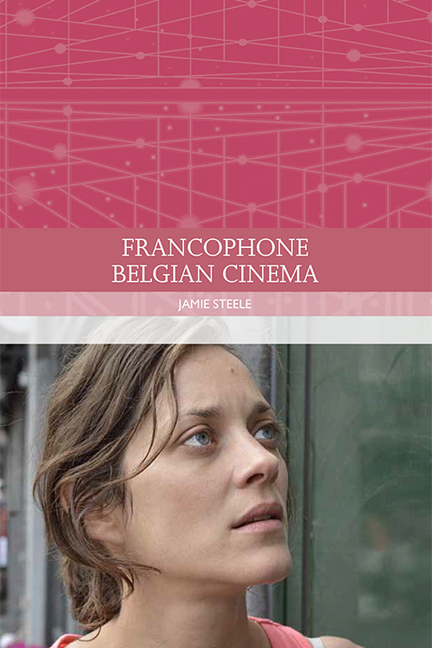Book contents
- Frontmatter
- Contents
- List of Figures
- Acknowledgements
- Traditions in World Cinema
- Introduction: Regional/National/Transnational Debates in Francophone Belgian Cinema
- 1 The (Francophone) Belgian Film Ecosystem: Trends in Production, Distribution and Exhibition
- 2 ‘No Future’: Social Marginalisation, Social Precariousness and Depictions of Seraing in Le gamin au vélo (Jean-Pierre and Luc Dardenne, 2011) and Deux jours, une nuit (Jean-Pierre and Luc Dardenne, 2014)
- 3 ‘Stills’ and Fragmented Families: Contemplating the Private Sphere in Joachim Lafosse’s Wallonia
- 4 From Slag Heaps to Cliffs: The ‘Marked’ Regional Landscape in Cages (Olivier Masset-Depasse, 2006)
- 5 The Francophone Belgian Road Movie: Eldorado (Bouli Lanners, 2008) and Ultranova (Bouli Lanners, 2005)
- 6 Lucas Belvaux’s Return: The Thriller Genre and Heists in Liège
- Conclusion
- Works Cited
- Films Cited
- Index
Introduction: Regional/National/Transnational Debates in Francophone Belgian Cinema
Published online by Cambridge University Press: 29 April 2021
- Frontmatter
- Contents
- List of Figures
- Acknowledgements
- Traditions in World Cinema
- Introduction: Regional/National/Transnational Debates in Francophone Belgian Cinema
- 1 The (Francophone) Belgian Film Ecosystem: Trends in Production, Distribution and Exhibition
- 2 ‘No Future’: Social Marginalisation, Social Precariousness and Depictions of Seraing in Le gamin au vélo (Jean-Pierre and Luc Dardenne, 2011) and Deux jours, une nuit (Jean-Pierre and Luc Dardenne, 2014)
- 3 ‘Stills’ and Fragmented Families: Contemplating the Private Sphere in Joachim Lafosse’s Wallonia
- 4 From Slag Heaps to Cliffs: The ‘Marked’ Regional Landscape in Cages (Olivier Masset-Depasse, 2006)
- 5 The Francophone Belgian Road Movie: Eldorado (Bouli Lanners, 2008) and Ultranova (Bouli Lanners, 2005)
- 6 Lucas Belvaux’s Return: The Thriller Genre and Heists in Liège
- Conclusion
- Works Cited
- Films Cited
- Index
Summary
‘Good evening everyone. It is a critical hour, please excuse us for this interruption […] Flanders is going to unilaterally proclaim its independence’ is the epiphanic and irruptive opening line from the feature-length docudrama Tout ça (ne nous rendra pas la Belgique/Bye Bye Belgium (2006). On 13 December 2006, the pre-recorded Bye Bye Belgium was broadcast by the television company RTBF (Radio et Télévision Belge Francophone) across Belgium. The programme posited the end of Belgium as a sovereign and political entity, drawing on a pervading sense of ‘national trauma’ (Collard 2014: 544). In the French-language newspaper La Libre Belgique, film critic Hubert Heyrendt diachronically noted that, even six years after its initial release, the made-for-television film remained ‘in the Belgian collective memory’ (Heyrendt 2012). As Frédéric Martel observes, the docudrama was based ‘on the model offered by Orson Welles’ War of the Worlds [radio play]’ in which ‘programming on RTBF was cut short and interrupted [… by] interviews with real politicians and falsified reports’ (Martel 2010: 400). The programme becomes even more prescient given the discourse around the notion of ‘fake news’, a byword of 2016.
Bye Bye Belgium comprises news bulletins and interviews with prominent figures in politics and the media, examining the political issues (such as national debts, the proposed national border, the new currency, the territoriality of Brussels and the naming of Mechelen/Malines as the Flemish capital) and socio-economic issues (the loss of jobs and the movement of businesses between Belgium's regions). Collard interprets these events as examples of ‘subversive remediation’, proposing that ‘RTBF's spoof newscast effectively staged multiple communicative texts simultaneously, and in so doing, stimulated in the minds of interpreting agents the very type of cognitive procedure as when presented with an adaptation’ (2014: 550). In essence, it offers another version of ‘ethnic tensions’ (ibid.) between francophone and Flemish Belgian speakers. The false presentation of these political concerns and issues on La Une (a RTBF-run television channel) contrasts dramatically with Mosley's (2001: 11) analysis of public service broadcasting in Belgium. Mosley posits that ‘in times of national crisis […] informational programming (news bulletins, interviews, panel discussions, etc.) offers itself as a preferred source of identification and reassurance’ (ibid.).
- Type
- Chapter
- Information
- Francophone Belgian Cinema , pp. 1 - 25Publisher: Edinburgh University PressPrint publication year: 2018



